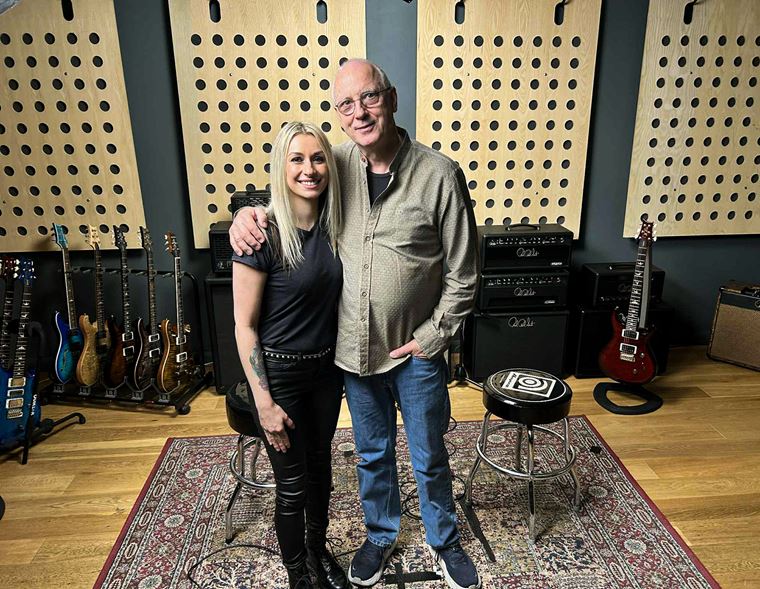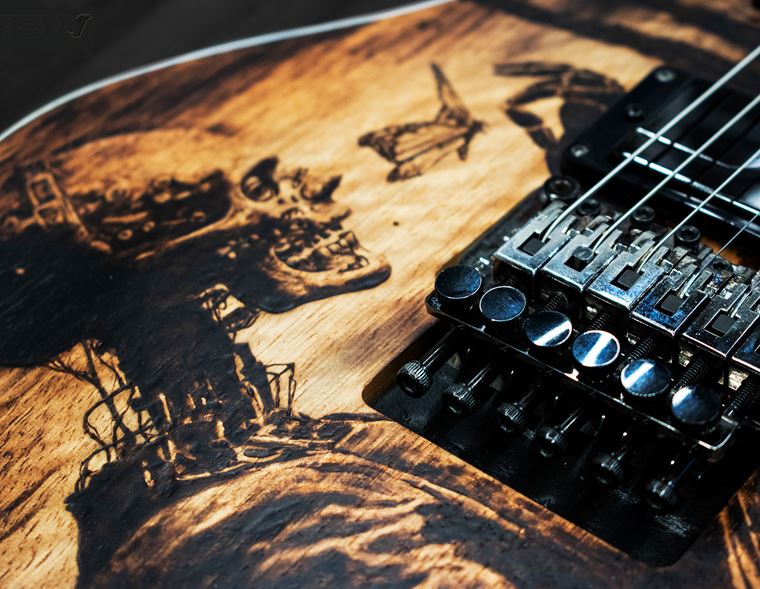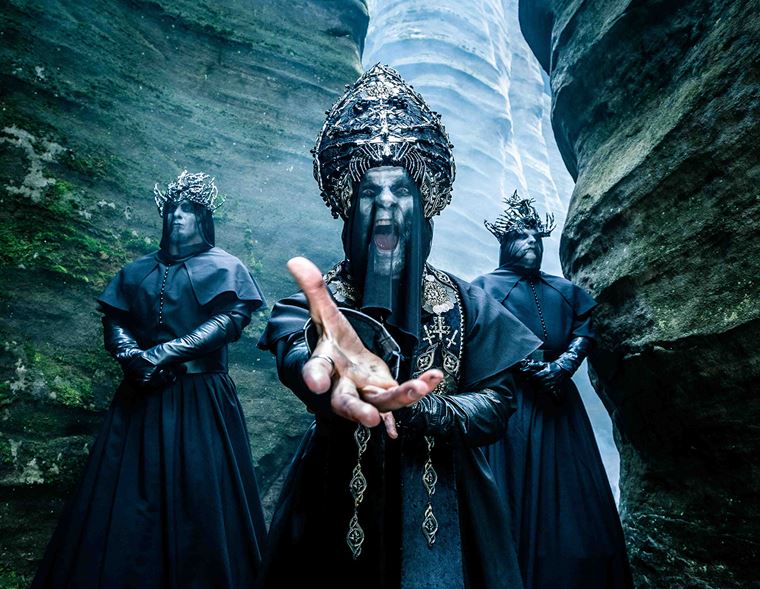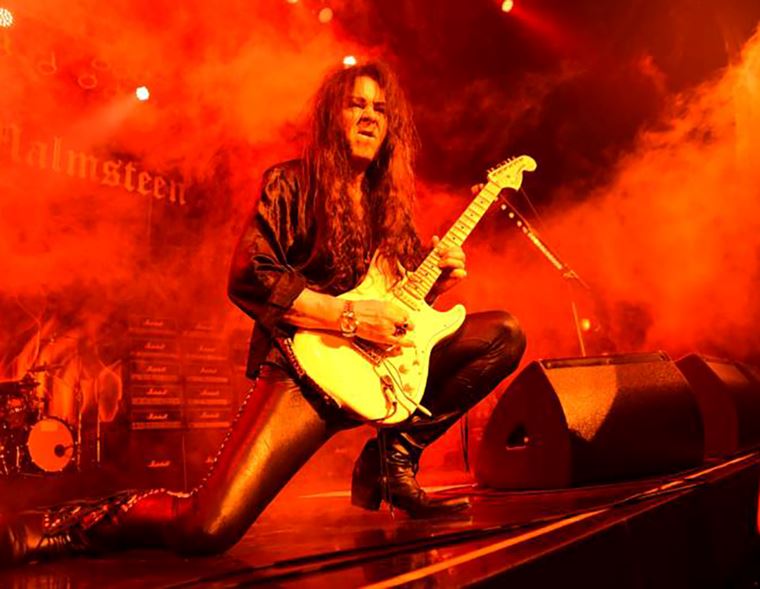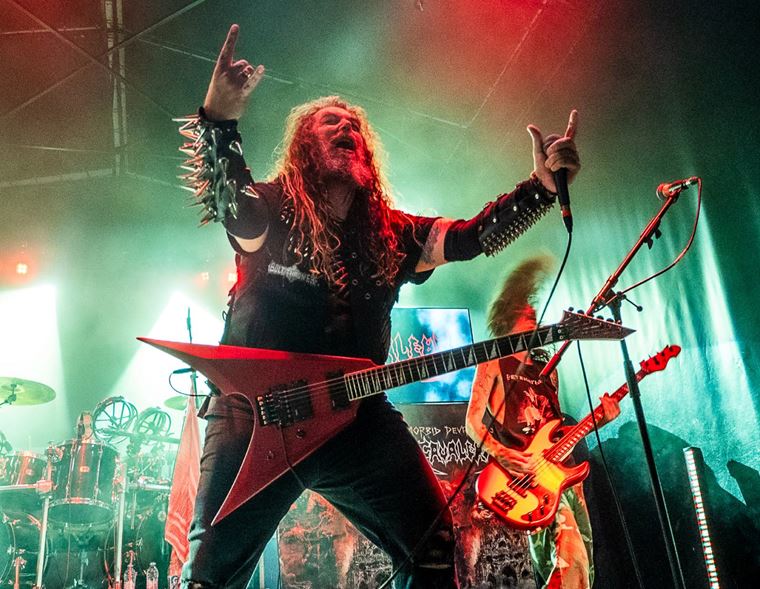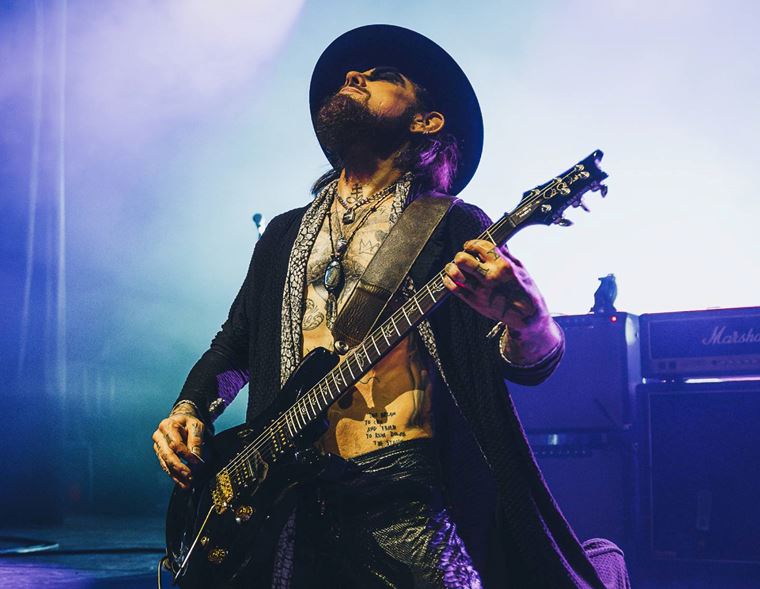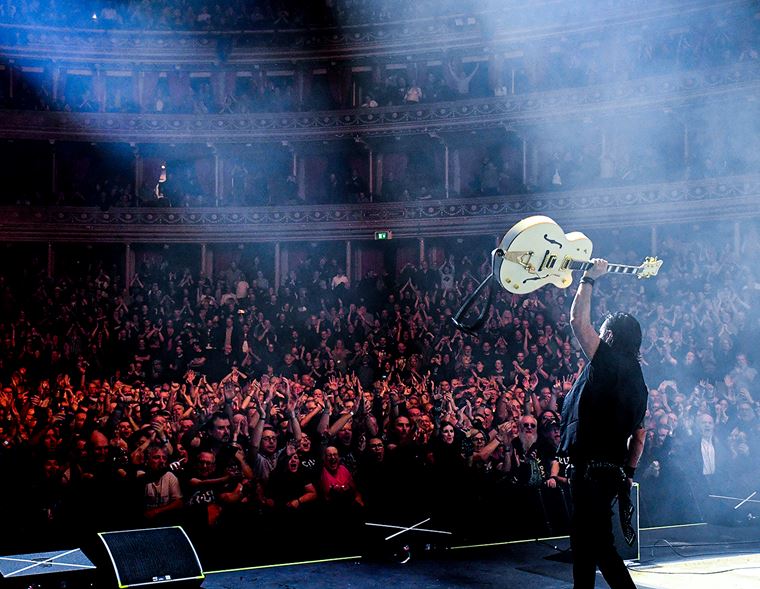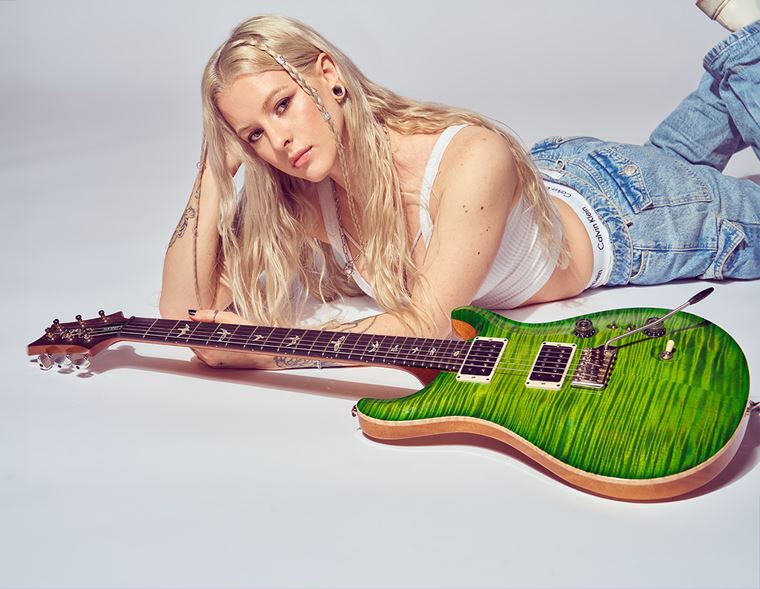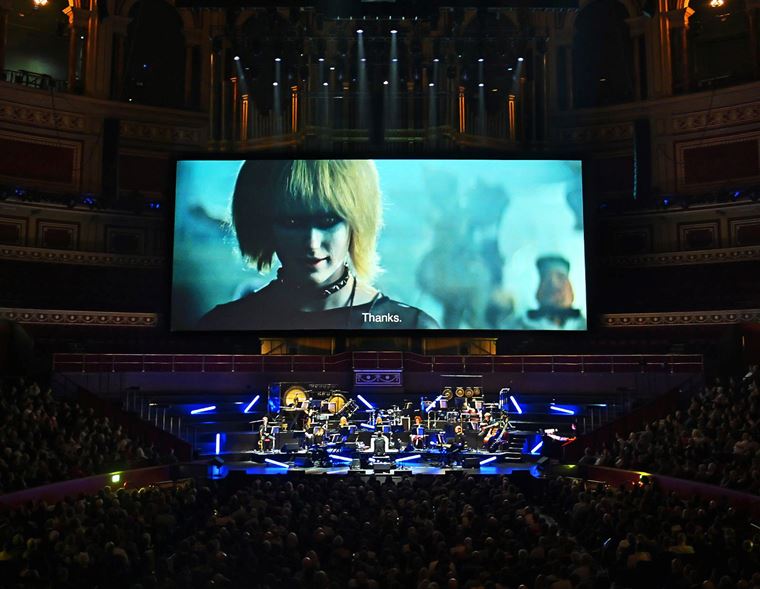JANE'S ADDICTION: Dave Navarro is BACK! Exclusive Interview
Some bands come with expectations. Jane’s Addiction - originators of the entire ‘alternative rock’ movement and inventors of Lollapalooza - come with perhaps more than most.
Since the mid 1980s, the Los Angeles-based band have brought danger, drama, colour and an unbridled sexiness to a rock scene that often feels like it has forgotten what rock music actually is. With a dark, shamanistic energy, Jane’s Addiction - fronted by vocalist Perry Farrell and joined by Stephen Perkins on drums, bassist Eric Avery and guitarist Dave Navarro - are a band that shook the foundations of their scene again and again until the shockwaves spread across the world. They took elements from hard rock, goth, folk and punk, blending it all into a potent gumbo that evidently tastes as good today as it did in 1987.
I say this because Jane’s are spectacularly back in action, selling out international tours with the original lineup fully intact. Like the legend of King Arthur not dying but only resting under Glastonbury Tor until his country needs him again, Jane’s Addiction have responded to a world in dire need of some proper hard rock fireworks, and have delivered that response in the only way they can: with energetic, intense, emotional and joyous live shows of a kind we hardly ever see any more.
Did you catch them on their recent UK tour? I hope you did, because to call the shows ‘special’ is quite the understatement. As a long-time Jane’s fan, it was a wonderful thing to see them in full flight, particularly with Dave back playing again after a long bout of illness.
Dave Navarro. One of the few truly iconic guitar players out there right now. A real-deal guitar hero, Navarro changed the game with Jane’s before going on to become a member of the Red Hot Chili Peppers for their One Hot Minute record and tours. Famous for a number of reasons (amongst them, a TV show host!), Dave is one of those people I’ve just always kept an ear out for. His playing and writing are wonderful, and he has always struck me as an interesting character, so I made some enquiries and tried for an interview whilst he was in Glasgow.
Sadly, there was no time, but he did kindly suggest that we could do a Zoom some weeks later whilst he was in Amsterdam. What follows is our full hour of conversation, beginning with One Hot Minute, taking in the early days of Jane’s, the on-stage troubles of Lollapalooza, and the new material that is just starting to appear right now.
We talk guitars, of course: his loyalty to PRS, his iconoclastic guitar choices in the 80s, and some good specific anecdotes about his playing on some of the most beloved Jane’s Addiction tunes such as Oceansize and Three Days. For a fan, this one was a real privilege, and I’m happy to report that Dave was a most pleasant person to converse with: laid back, great with descriptions and displaying an excellent deadpan sense of humour. This article is a good long length, but how often do you get to chat music with Dave Navarro? Grab a coffee and get comfy, because this isn’t one you want to skim through!
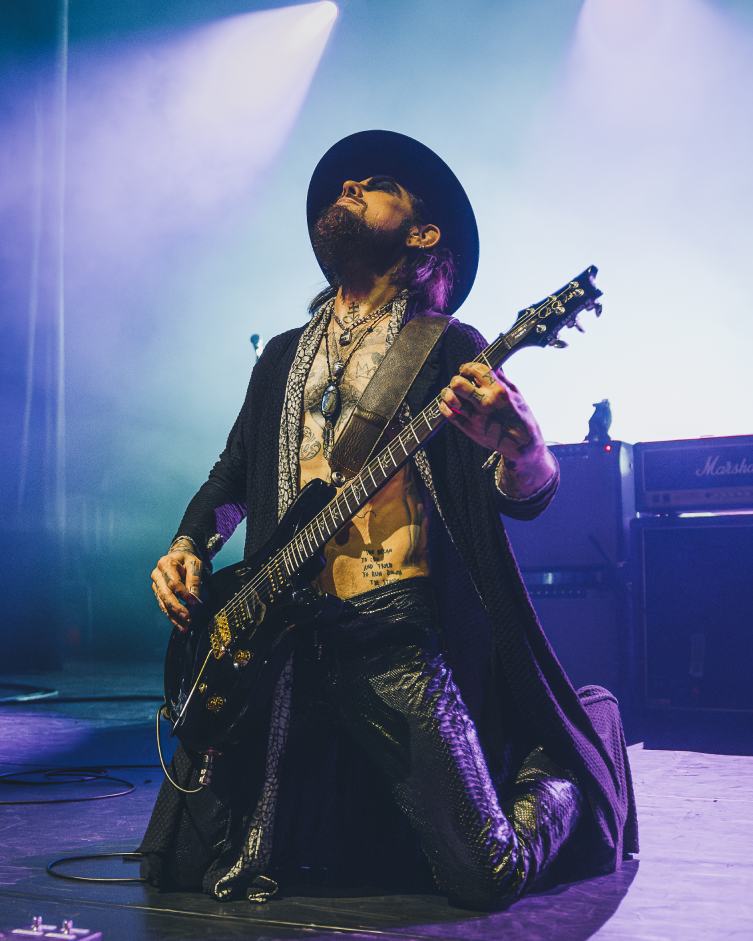
(photo: Emilie Bardalou)
Contents
Dave Navarro Interview - Chilis and Early Jane’s Addiction
Three Days and the Writing Process
Dave Navarro Interview - Chilis and Early Jane’s Addiction
Guitarguitar: So it would’ve been away back to One Hot Minute, that would be when I first heard you. You're one of my all-time favourite players, so this is gonna be a real pleasure for me.
Dave Navarro: Oh, that's nice. A lot of people didn't really care for that record! You know, musically our backgrounds were so incredibly different that it kind of shows on that record. I recently listened to some of it and I was like, wow some of the musical stuff here is kind of cool!
GG: Oh yeah!
DN: So I appreciate that, because it wasn't well received, but that's what it sounds like when you take a guy from one band that has a distinct sound and mash it into a band that has another distinct sound: it's gonna clash a little bit! In fact, when Flea joined Jane's Addiction in 1997 for a tour, he doesn't use a pick - Eric uses a pick - so a lot of people were whining about that! (laughs)
GG: You can't please everybody!
DN: We do the best we can.
GG: Exactly, and there's some amazing moments within that record. One day it will connect and people will realise it's one of the best Chilis albums.
DN: I appreciate it. Look, I'm proud of it and I had a great time working with them and touring with them. Especially playing with Chad and Flea as a rhythm section. Like, I just got a crash course in timing and funk in all kinds of areas of music that I wasn't really proficient in. Since then, I've gone on to play with literally hundreds of players but with every experience I’ve learned something, and then I bring it back home into my own band. I really am grateful for my time with them because I learned so much.
GG: For sure, yeah. You mentioned the rhythm section there: I mean, Eric Avery and Stephen Perkins are pretty much champagne when it comes to the rhythm section, aren’t they?
DN: They're my favourite rhythm section, ever. Eric is really the backbone of this band, musically speaking. Take basically any song of ours: take the guitars and the drums away, and just leave the bass and the vocal: it's still a great song. You know what I mean?
GG: Yeah, and it's still Jane’s Addiction as well. It's still got that unmistakable identity.
DN: Absolutely. And that all comes from Eric. And then Stephen, I've been playing with since I was 15 years old. We met in high school. We were both in the marching band, in the drum corps. He told me he played drums, I told him, ‘oh, I'm a guitar player, actually’. We got together and jammed and formed our first band at 15.
"My approach was more Shine On You Crazy Diamond than Crazy Train!"
So from 15 to 57, it's a lot of years playing with the same drummer (laughs) We can read each other's minds: he and I have telepathy! And every night we do different things. We’ve been playing these songs for 30 years and it's like, we want to keep it exciting. So little things that the audience may or may not know, die hard fans notice. Stephen's very reactionary, so I'll do a slide or I'll do a harmonic or I'll do a little solo bit in the middle of something, just flavour it up and just to keep it on the edge. I like that feeling of not knowing whether or not I'm going to pull it off, you know? (laughs) Like, ‘oh my god, is this going to work?’ I'm going to put it in there and then he'll react to it.
And if you listen to the records, he's always reacting to the vocals. He's one of the busiest drummers around, but when Perry's singing, he's out of the way. And then he gets crazy in the spots where there's no vocals, very much like Keith Moon in a way.
GG: Yeah, true. And actually, what I was thinking there, when you were describing that, he’s also quite like Danny Carey from Tool, in the sense that he's kind of like a lead instrument player on an instrument that isn't really supposed to do that. Even though Eric's quite a melodic player and you're obviously such a fantastic lead guitarist, so it's kind of like you have three really expressive voices there before you even get to Perry.
DN: Oh, yeah. And then Perry, he pulls out melodies out of nowhere, out of the top of his head, that are so unique and memorable. And the crazy thing about a lot of Jane's Addiction music is that there's not really, we don't really have choruses. We have a couple songs with choruses but you think about Jane Says: that has two parts to it. Mountain Song has two parts to it. Stop: there's no chorus! Like there's just…Ain't No Right, there's no chorus! (laughs) It's weird, like it's just because the places he goes to vocally are so memorable that we don't need that ‘here comes the chorus’ every time.
Three Days and the Writing Process
GG: D’ you know, I've been a fan for years and I’ve never noticed that! Songs like Three Days, that doesn't really even have a standard structure - I mean, what an incredible song - it doesn't go A, B, A, B, anything, it's kind of A, B, C, D, E, F, G, isn't it?
DN: Yeah, we have the intro, and then we just abandon that. (laughs) And then, what is it going to? It goes into ‘shadows of the morning light’, which is a big open power chord thing. And then we abandon that, we never come back to that. And then we go into this, like, rotating bass riff that I'm just playing some chords over. And then I take a rather long guitar solo that was improvised in the studio. And then we go into another completely different section.
You're right. Nothing returns. I think in the back side of the song, there's the ‘erotic Jesus’ part where you get the da da da da. That happens twice! (laughs) It does reoccur. Then the outro is completely its own part. And if I remember correctly, Perry and I wrote that song, well, Eric had the bassline, the intro baseline. And then I brought a case of beer over to Perry's house and he and I stayed up all night long and just kept writing: parts, parts, parts. Man, I think the reason is because he didn't write lyrics to fit music: we would mostly write music to fit poems.
GG: Oh, I see.
DN: So he would have poems in a book and then based on the words, that would dictate what the sonic soundscape would be. So in that particular song - that particular poem - it just kept going. That was a really fun one to put together. And then, you know, Eric and Stephen come in and just add, you know, their genius to the mix.
Yeah, that's a fan favourite, that song. It's one of my favourites to play live.
GG: I can imagine!
DN: I don't get bored, you know?
GG: Yeah, there's a lot to do! It's one of those songs that puts you on the map forever as a lead guitarist. It's an incredible piece of solo playing there.
DN: Thank you. I don't want to claim that Jane’s Addiction doesn't have choruses: we do in Had a Dad, and there's plenty of songs that have choruses, but the ones that we're known for, you know, Mountain Song is like a verse and a bridge and a verse and a bridge, a verse and bridge (laughs). It never really goes into that chorus that, you know, pays off.
But that's one of the things that keeps the tension, you know what I mean? It makes it so you're just on the edge the whole time. And it's really simple!
GG: Yeah, it's simple, but it's played with a lot of finesse and a lot of conviction and a lot of invention. So the kind of boiled-down idea, I get what you mean about it being simple, but then the music elaborates on it. Actually, on Three Days - just since we were talking about it -, I'd love to talk about that part really close to the end of the song, where we've had the big crashing epic drama, then it really brings it right down to that really small part, you know the bit I mean?
DN: Of course I do!
GG: Was that just one of those many parts that you and Perry thought of and just selected?
DN: It’s so hard to remember how that happened.
GG: It's such an unusual thing to happen.
DN: Yeah, I think we were thinking cinematically. You know what I mean? The way I view it is if you had a camera and you had a big overhead shot of maybe a war taking place.
Like a satellite shot, and then you zoom down and you see a child holding his puppy in the middle of this insanity and then you zoom back out to reveal the war again. It kind of had that cinematic vibe to it, you know what I mean? Within the chaos, there's somewhere there's love and beauty and that's how I look at that part.
It's funny, Stephen drops out completely on the drums. So Eric and I always walk over to each other and, you know, some rooms you can hear better than others in (laughs), so our system is: he taps his foot and I stare at his foot and we kind of just cross our fingers and we play through it, haha. We pretty much get through it every time. But yeah, it is unusual. I really like that, It has more of a score feel to it than a song feel to it.
Beautiful Darkness
GG: It absolutely does, yeah. And with that tune, and with a lot of the… I don't want to say the ‘best’ of Jane's Addiction, because who am I to say? - but a lot of my favourite Jane's Addiction music has this kind of beautiful darkness to it.
But there is a triumphant energy as well, and it's kind of that juxtaposition that I love so much. I wonder, first of all, if that's something that you agree with - as one of the people who wrote the music - but also, I wonder about reconnecting with those energies. Are you able to reconnect with how those initial things felt each time you play them all these years later?
DN: Well, I'll tell you, this tour in Europe that we're on currently - I'm in Amsterdam right now - it has been very easy to reconnect to that. And this is the first tour I've done with this band with Eric Avery back in the band. Chris Chaney (bassist on previous Jane’s tours and recordings) is one of the greatest bass players of all time and he's now in AC/DC which is pretty crazy because it's almost like putting Miles Davis in a marching band!
But hey man: he's happy playing those songs and nobody is more equipped to play AC/DC than Chris Chaney. But having the original lineup from the 80s playing these songs again, yeah, I really do feel some of the haunted nature of the music, especially when we play songs like Then She Did, Three Days… um, we’ve a song that we brought back that we've been doing called Kettle Whistle…
GG: Yeah, I love that song.
DN: That was written in I think 1987, 1988.
GG: Oh, and you never recorded it until about ten years later?
DN: We never really actually recorded it the way it went. We put out a collection album of like, you know, scraps and, you know, I forget what it was called…
GG: It was called Kettle Whistle!
DN: Oh, was it called Kettle Whistle? Hey, there you go! (laughs) But the version that's on that has Flea on bass. It's a totally different production and it's not how it was intended to be played. The way we do it now has more of a Velvet Underground meets, you know… black death metal. I mean, that's the way I look at it. And again, It's three parts only: boom boom boom! Just keep doing ABC ABC. What carries the song and what keeps it from being boring is that Perry is melodically going all over the place. He didn't find a melody and keep repeating it: he's telling a story.
So yeah, that song has really been effective for me emotionally. But I do - as you point out - some of the darker material, I'm a little bit more passionate about it than say, Been Caught Stealing or Standing in the Shower or Idiots Rule, like some of the ‘white funk’ songs. Back in the late 80s/early 90s when we did write a lot of kinda quirky, funny songs like - and I love them - don't get me wrong - and some of the musicianship on those songs is really great. It was a nice juxtaposition of like, ‘wow these guys can get really fuckin’ heavy or they can have a really good time’ and you know it just kind of encompasses all the human condition, I think. The ones that I love are the ones that I can get lost in on stage and the ones that I can explore on the guitar with the most freedom.
You take a song like Then She Did or Three Days or Kettle Whistle or Ted, Just Admit It, from night to night, sometimes they are seven minutes, sometimes they are twelve, and I love that I love not knowing how it’s gonna go.
GG: Those are some of my favourite Jane’s songs too: it's the artistic sort of intensity with that - I think it's darkness, so I'm glad you're agreeing with me - but I don't mean it’s dark music as much as it just has a darkness, it's like it's got a shadow.
DN: Uh-huh, I understand that, yeah.
Energy & Connection
GG: Yeah, so talking about energy, I was at the Glasgow show a few weeks back. I've seen Jane’s Addiction three times and this last time, I’ve never witnessed energy at a show quite like that. It's pretty phenomenal, the connection, both on stage and also the back-and-forth with the audience. From being a Jane’s Addiction fan, I know that the band had a reputation for being able to do that back in the day. So, is that kind of one of the goals: to have that visceral connection in that moment?
DN: I don't know if it's a goal, I think it's something that just happens. That very thing that you're talking about is why I prefer, well, I like festivals, but that's why I prefer our shows, because it's our fan base, we're not trying to win anybody over, and they're right there. Right up in front. In the festival scenario, you're dealing with a lot of people that are there, frankly, to see other acts and just have a good day and have a celebration, and they're very far away.
It’s a little bit more difficult for me to connect in those environments, but when I'm face to face with the people and I can just I can see the emotion in their eyes… The other night there was a girl who was crying during Jane Says and I was like ‘this is so special’. But I don't know if it was a goal or if it was something that just started developing over the years, but you know we really appreciate them.
Also, just frankly speaking as a 57 year old man, the fact that anybody is showing up to watch me play guitar, and to watch my band: we’re grateful for that, you know? Really grateful.
GG: Speaking on behalf of the audience, I think we're all really grateful to have you back as well, so I think it works both ways.
DN: Thank you.
New Music and Early Music
GG: You've been playing new songs. I wonder if this is an indicator of maybe a new record that's perhaps on the horizon?
DN: Oh, we've been recording new material!
GG: Nice! How's that been going?
DN: It's been great. I think pretty soon a couple of songs will come out. One's called Imminent Redemption, and the other is called True Love. I feel like they're very ‘Jane’s Addiction 1.0’ sounding, which is great, you know, because when the band started, it was all analog taped, and it was all live performances, and then overdubbing and stuff like that. Some of these songs are like that: they're live drums, and they're live basic tracks. They feel like the first incarnation of the band to me.
And then we have some material that is very different and very left field. But I like having a band where we're not stuck in a genre. We used to do just purely acoustic shows in the early days, you know, and before that was even a thing.
GG: Sure, exactly.
DN: You know? Before the GnR acoustic record came out. Actually our first album, I think the second half is acoustic, or primarily acoustic.
GG: The Triple X, self-titled one?
DN: Yeah, the Triple X one. I think at that time, we were really experimenting a lot, because Stephen and I came from a very 60s and 70s-driven background, and also a lot of heavy metal. And we were huge Rush fans, we were huge Van Halen fans, but we were also die-hard Deadheads, and Zeppelin fanatics, and The Who, and Hendrix of course, and Eric Clapton, you know, Cream, so that's the world we came from.
Eric was more from a punk rock background, and post-punk, Joy Division, kind of more English bands, and Perry was, at the time, in a kind of a goth band called PSI COM. It is very odd that the four of us got together to make music, because on paper, it doesn't make sense. But we went through an experimental phase. We basically went through our Led Zeppelin III-phase (laughs). Everything was acoustic, and I'm trying to actually revive a couple of those acoustic songs and record them properly.
GG: Oh, nice!
DN: So we had punk rock, goth, technical precision, musicianship, and a hippie band. You know what I mean? There was just nothing like that. There was nothing to indicate that the four of us should be playing music together. If you were to answer an ad in the paper and we'd all written down our influences, nobody would have answered the ads. (laughs)
"Eric is really the backbone of this band, musically speaking"
GG: Haha, and yet look what happened!
DN: Yeah! Well, as a result of being around those guys and picking up on what they were listening to, my guitar playing changed quite a bit, you know, because I went from being a total Hendrix 60s fanatic to being just really interested in Daniel Ash and Robert Smith and guys who played real simple, haunting, stuff. And it wasn't so much about proficiency, but it was about effectiveness. It was about, you know, whether or not it pulls out the heartstrings, melodic stuff.
I think that’s where it bridges for me as a fan of music, and it's probably why I would say Jimi Hendrix is the reason I play guitar, but my favourite guitar player is David Gilmour, because he's technically proficient, but he can also make you weep with melody and simple phrasing. So with Gilmour, I find my 60s-throwback-technical-precision, but I also find my English sensibilities of not overdoing it and leaving space, playing when appropriate and stepping out when it's time to step out. The only anomaly in there is and I'm an Eddie Van Halen fanatic, too! So when I'm alone at home, that's what I'm playing! (laughs)
GG: Hey, you and me both, Dave. It's hard to avoid! And you know, Eddie knew when to be quiet as well, at least on records! He's a lot more of a tasteful player than his shreddy reputation suggested, though obviously he was a legend.
DN: Oh yeah!
Dave’s Guitar Style
GG: It was all about his great rhythms. But interestingly, Dave, one of my big questions about you was about the mixture of styles that I think makes you such an exceptional and interesting player. You've got what I would just call solid ‘proper guitar god’ moments that we mentioned earlier, but there's the kind of ethereal texture-ey stuff which really drew me into what you're doing, like on Summertime Rolls. But there's some really unorthodox things happening with your guitar as well Ted, Just Admit It.
You’ve kind of answered my question already, but we might develop it a little bit: were you consciously cultivating that direction, or did it just happen as a natural accumulation of what you're into? You're kind of saying that the band's influence was part of that too, right?
DN: The rest of the guys, their influence had a lot to do with that and I think that also, I really did the best I could to serve the song and the lyrical content, and what was happening with the rhythm section. Some of the stuff that I wrote, even, they would change their sensibilities to accommodate what I was doing.
I always say this in interviews and I apologise for repeating myself, but my two favourite records of all time are Tommy by the Who and The Wall by Pink Floyd. Both of those albums - I know they made movies about them - but the albums on their own are cinematic and they get into every crevice of the human emotion. They're full of angst, they're full of sadness, they're full of life and darkness and just emotional raw vulnerability. Those two records really changed my life and I think that I drew upon not so much the guitar playing, but I copied the feeling that you can take an instrument and you can create different moods. I also spent a lot of time unconventionally playing with the guitar, just trying to find out ways I can make noises out of it that you're really not supposed to. (laughs)
Like if you take the solo in Standing in the Shower, which is really, really high, people have asked me like, how did you get that note that high? It was before the digital whammy thing. What I did was, I took the string and I pulled it right off the neck, so it's actually resting on the body of the guitar.
GG: Oh, is that what it is?!
DN: I'm yanking it up there. I've tried to do it live a bunch of times and I break the string every time. I was always looking for some unconventional way to do stuff and a lot of that was with effects, but at the same time, I pretty much used the same exact setup today that I used in you know, Lollapalooza 1 in 1991. Same pedals, same amps, same guitars, and I have Paul Reed Smith guitars. That's what I, 1991 is when I started playing Paul Reed Smith guitars.
GG: Yeah, right. Now, I'm just about to get to the guitar question, but see just on that little last bit there, there's a piece of your playing in a song that I think encapsulates a lot of what we were both talking about there, even that sub-notion of David Gilmour, the drama that's in the playing. It's the first solo in Oceansize.
Oceansize is full: it's all over our ears and it is quite oceanic with its sound, it feels like it’s crashing waves. As a guitar player I wanted to ask about the first lead break: those notes for me are actually quite unorthodox. It seems like you're not playing what I would have expected a guitar player to do: it’s outside those box shapes. I wondered, was that an intentional thing? And what indeed were your intentions when you were creating that piece of music? What are you trying to get across?
DN: Well I think… so Oceansize comes after Up the Beach on Nothing’s Shocking, right? So Up the Beach is this musical piece that's just kind of like an introduction into the band, then we go into Oceansize. That solo section you're talking about is the first solo section on the record, and I was trying to be very conscious of not just coming out of the gate ripping. I was like 19 or 20, I don't know how old I was, but I didn't want to come out of a gate just shredding as fast as I could, and that song does call for it at times!
GG: It does!
DN: But I wanted something melodic and memorable that you could sing along in your head and that didn't take off yet, because the second solo takes off. I wanted to keep us in the space of the verses. I think that I just kind of wrote that melody. But if you really listen to it, there's a blue note in there, and then Perry screams over that note. It's just a really odd note. It doesn't really make sense. And then Perry screams over that note, so what you have is a note that kind of sticks out in a dog ear kind of way, like it’s just wrong? And then you got Perry’s kind of gut wrenching scream over it. And it takes a melody that's really simple and never moves fast, and just kind of tweaks your ear a little bit. For me, I felt that it just had an impact just like that.
And so yeah, I was conscious of just trying to not… because that would have been the perfect spot to just come ripping out, you know? Playing some real fast thing but I wanted to play something melodic and memorable. It was Gilmour inspired. I don't sound anything like him, my sound is nothing like him, my tone is nothing like him, but my approach was more Shine On You Crazy Diamond rather than Crazy Train (laughs). I think that both approaches would have worked, but I like that. And oddly enough, that's the one solo that night after night, I pretty much play it note for note.
"I went from being a total Hendrix 60s fanatic to being just really interested in Daniel Ash and Robert Smith and guys who played real simple, haunting stuff"
GG: It's what's required right?
DN: Kind of, yeah! I grew up listening to bootleg records of Hendrix, Zeppelin and Cream and those guitar players - Jimmy Page, Jimi Hendrix, Eric Clapton - they never played the solos that were on the records, they were improvising live every night. I grew up thinking that's how it's supposed to be done. So I never learned a solo that I played.
GG: I see.
DN: You know what I mean? So so when I play them live, I stay within the basic framework of what the solo was, but I'm always going in and out of it and kind of pushing myself or some nights I'm giving myself a break, whatever it is, but for some reason, the one that you picked up on is the one that I actually learned and played.
GG: Wow, there you go! And you're right: it could have been very much been the moment for the ‘Dave solo’.
DN: Yeah.
GG: But then, as you say, there's a second one and it is really showy. It has equally unusual notes that are really fast. Not to sort of zone in on this song but it’s quite an exceptional piece, guitar-wise. That really fast part, to me, also feels like an unusual bunch of notes, but was that just kind of like how you would typically approach a fast part at that time?
DN: You know, I'll be honest with you. I never wrote those guitar solos and to this day I still don’t. I press record and I see what happens. That's just what happened, you know I mean? (laughs) And then if I've got a punch, I'll punch here and there but there's a bunch of versions of that song where I'm playing completely different stuff. I don't know that series of notes that you're talking about at the beginning of that solo, that fast bit. Yeah, I just went a little bit outside of the box, you know?
I admit that I'm a pretty die-hard box player. I don't think of myself as a great shredder, and I don't think of myself as a great atmospheric player, and I don't think of myself as a great aggressive player, or any of those kinds of things, but I do tap into all those areas. And yeah, sometimes just going slightly out of the boxes for me is fun, but, really at the core of it all, I'm a Hendrix trained blues guitar player.
GG: I get you: I get you, but I think you're more out of the box than you think you are! Especially on things like Kettle Whistle and so on. I would also say that those little those separate parts you mentioned are like a Venn diagram, with you in the middle section the shred guy, the texture guy, the unorthodox guy. And that's actually what makes you such a valuable player, because if any one player only did one of those things, it's quite one dimensional, and you’re a very three dimensional player. So I think there's a lot of value in that, actually.
DN: Thank you. Thank you very much, that's very nice.
GG: Not at all: it’s true.
PRS Guitars
GG: PRS, then! Yes. So, what brought you to PRS? You were originally Ibanez and some other stuff back in the day, right?
DN: I was an Ibanez guitar player because I was coming out of a heavy metal band with Stephen Perkins, and I loved just thin, easier to play, ripping, shred-sticks (laughs), you know what I mean?
I decided that was my thing. I love it. And also it worked well in Jane’s Addiction and it was weird in Jane's Addiction because a band like us, you would expect me to be playing like a Jaguar or something, you know? Like, visually on stage, and cool factor? Especially back in those days when we were really born from the underground scene and yet I'm playing flashy dayglow Ibanez guitars?! (laughs)
What had happened was Perry invented Lollapalooza, we took off for our first shows in Arizona and back then we were doing a lot of drinking and a lot of drugs and you know, it's the roll of the dice about how that's going to turn out usually. Perry and I did not come up with the same numbers and we got into a huge fight on stage.
GG: Oh, right!
DN: Yeah! It was like, we had all the bands play all day long, then it was time for the headlining band, Jane’s Addiction. We came out and played three songs, and then he and I got into it, I think physically, on stage. And I was like ‘fuck this’ and I went over my guitar rack and took every guitar I had, and I threw them out on the audience. I got rid of every one of them. And then I looked at him and I was like, what are you going to do now? You know what I mean?
GG: Hahaha, that’s wild, man.
DN: Like, that was me trying to get at him. All I did was fuck myself! (laughs) It's like, what are you going to do now? then I'm like, ‘Aw shit, what am I going to do? Is the real question!
So the guitar player from the Rollins band, Chris Haskett, was a PRS player. He had a show the next day, and I didn't have any guitars, and he said, well, you know, borrow mine.
And I was like, fuck, man, I got to play a festival with a guitar that I've never played before. I was spooked, because your instrument is like: you know how it feels, and you know what it does, and you know how it reacts, and I'm on the volume knob all the time, I'm doing stuff like that.
So, you know, I was really kind of spooked, I went out and I had Chris Haskett’s PRS, and I had a great show. I loved it! I said, dude, this is awesome! I hadn’t ever heard of them at that time, 1991? It was incredible! And he's like, ‘do you want me to introduce you to the company?’ and I was like, fuck yeah! And so I got to meet Paul and a bunch of the people involved with the company, and they sent me out I think two PRS guitars to finish out the tour with.
"When we got back into Jane's rehearsals and I started playing PRS again, it was like I'd been wearing the wrong shoes for the past five years"
I pretty much have just stuck with them since then. That's just my go-to, and now it's 2024 so what does that make it? Does it make it 33 years I've been playing PRS? With the exception of my stint in the Chili Peppers, because their back catalogue was so Strat driven.
GG: Definitely.
DN: You know what I mean? In order to appropriately play the songs that came before me, it didn't sound right: I needed a single coil sound. Personally, I like a fatter, more blown-out sound. As I said, I ride the volume a lot and sometimes I want to bring down the sound, but I want to keep the tone. I don't want it to get thin. I couldn't achieve that on the strats that I was using. So when I left the Chili Peppers, I went back to PRS. I was really just trying to do their back catalogue service. It wasn't like I wasn't happy with PRS, it was just like: this is a Strat band, historically.
And, you know, I mean, I love strats. I love that single coil sound. Like I told you, Jimi Hendrix is why I play guitar: I grew up on it. But, after I left the Chili Peppers, Jane's Addiction did a tour again, we re-banded. As I told you, Flea joined us for that. And I was like, well, Jane's Addiction is not a Strat band. So I got the PRS's out. And as soon as we started rehearsing, I was like, ‘oh, yeah, that's okay. I get it now’. And it was just like, I can't describe it.
In the studio, I play all kinds of guitars: I love telecasters, I love Stratocasters and I use them a lot for texturing and I do a lot of overdubs; I do a lot of layering. I like recordings to be really fat and thick and dense. And then when it comes to the live performance, I'm like, ‘don't worry about it!’ (laughs) It doesn’t have to sound the same!
So, you know, I'll use the PRS for a main rhythm track and then I'll double it with a Strat or a Tele so you can get the articulation of the notes in the chords but you still get that big fuzz sound at the same time. When we got back into Jane’s rehearsals and I started playing the PRS’s again, it was like I’d been wearing the wrong shoes for the past five years.
GG: Sure, yeah!
DN: And then you found your original pair of shoes, you're like, oh, these are way more comfortable. For me, you know? That's what I’d got used to doing and I found that with the PRS, with my pickup selector I could still get a twangy single coil sound out of it if I wanted to. However, I'm looking at you right there (Dave spies my Les Paul, just in the frame of our Zoom call) and my first guitar in Jane’s Addiction was a Les Paul.
GG: It has a sound that is required at certain points.
DN: It's absolutely required! I think all these guitars are required! That first Triple X record was a Black Beauty Les Paul. I think I lost that when we finished a show and Perry picked it up and threw it in the air, and it came crashing down and the neck just came off it. Oh man, there goes that one! Those early shows were very unpredictable, but in a beautiful way.
GG: You're playing a brace of very, very nice looking black PRS guitars with the gold hardware. I always remember your Dave Navarro signature model, the white one. Are these black ones basically the same guitar in a different colour?
DN: Yeah, it's the same guitar. The reason that I used the white ones… all right, so here's the crazy thing: and I'm gonna say this about PRS, and how grateful I am for them to do this for me, but one of their big attractions is the wood flame, you know? Like, the beauty of the wood and the stain…
GG: They are gorgeous!
DN: Yeah! That's one of the things that they're known for is being so beautiful. And here I come and I'm like, can you just ignore that and paint it white or paint it black? Solid, opaque colour? They're just like, ‘Uh, that's not really what we do here’ (laughs).
But the reason I went with the white one - and I still play it, I go back and forth - but the white one is an homage to the Isabella Hendrix white Strat.
GG: Yeah, Woodstock.
DN: From Woodstock, yeah. So that was my homage to him, that's why I chose that. And also because you could see it at the back of the room.
GG: True.
DN: Because I usually just wear black, I've always done that. But boom, white. And then I think it was my guitar tech that said, you know, you should have some black ones.
And I was just like, ‘okay!’ (laughs). And so we got some black ones. And now those have become my main guitars. The original white ones, I use for songs that are in alternative tunings. Kettle Whistle is in a strange tuning that I kind of had to invent.
"Jimi Hendrix is the reason I play guitar, but my favourite guitar player is David Gilmour"
GG:Oh, really?
DN: Yeah, D-A-D-A-A flat-D.
Or It's D-A-D-A flat A-D. I'm not sure, but it's just like, there's one string that's completely out of tune so you don't have an open strum, you can't just barre the guitar and make beautiful chords in this open tuning because there's one that's wrong. And that's for an effect in the chorus where it kind of goes to like a weird Kashmir kind of vibe. I needed it to sound Middle Eastern at one point. So I use the white ones for alternative tunings and I use the black ones predominantly for the full shows.
GG: I love the look of the black ones. Actually, 33 years of playing PRS, that's a good anniversary time for PRS to release a special edition run of them! You never know!
DN: You never know, man. I mean, I don't know if they like painting their guitars opaque, but I certainly love them! And I do have a number of beautiful stained wood ones that they do. But I think in a live setting, I just want to get down to the nuts and bolts of things.
GG: Yeah, those solid finishes look more ready to go. They look more ready for action.
DN: I feel like that. I feel like they are precious, but they look less precious. Somehow, I feel less bad taking the headstock and hitting one of the cymbals with it, which I do quite a bit. I'll jump up on the riser and I'll hit a downbeat of one of Stephen's cymbals with my headstock. I think that if I had some beautiful flamed, intricate wood showing through a beautiful stain, polish and finish, I would be a little bit more careful about it (laughs). And I just want to beat ‘em up, you know?
Layers and Textures
GG: Just beat ‘em up, exactly! I won’t keep you too much longer, you've been so generous with your time. There's something about what you were talking about just there that I would love to develop: when you were talking about the overdubbing that you do. I know how into fine art and graffiti art that you are as well. I wonder if that's a painter thing. You have two ways of making records, the way I see it: you can paint like layers or you can sculpt the sound back, kinda like Brian Eno versus Steve Albini or whatever. It seems to me that you're very much a painter with a guitar. Would you agree with that correlation?
DN: You know what's interesting you should say that because I do paint as well. I have always been asked about that, and I’ve always said that different tones have different colours to me. They create depth and texture as you would see in a painting, on an audio level. So yeah, I think that there is a very strong correlation. I think that every tone and every effect and every guitar and every bit of circuitry or amplification that you run through is its own brush. And its own colour, absolutely. I mean, I have felt that way, my whole life, I've always thought about it as cinematic, film.
But then again, the same description applies to painting. I just love layers and textures. And I also love moments in songs that you may not have heard the first five or six times you heard them. And then the seventh time you hear them and you're like, ‘wow, what was that? I've never heard that before!’. I love those little things, you know, and I've always been, it's always been that way with Pink Floyd.
And if I had to say that I had a number one influence and obviously favourite guitar player it's Pink Floyd without a doubt.
GG: Yeah, and they were all about the painting and the colours and things themselves, so that makes a lot of sense. I'll wrap up with one last question but you know one thing I forgot to ask you earlier on when we were talking gear? It's the smallest question ever but I'm always interested in what kind of guitar pick do you prefer?
DN: Guitar pick? Just a medium.
GG: Like Tortex or something?
DN: No, it's just a Dunlop Medium. I've always just been a Dunlop guy.
GG: Cool! I always wonder! It's like the most direct thing, it's the paintbrush before you even get to the paint so it's always interesting to know.
DN: Yeah! The Thins, I can't get any feeling because I don't feel like there's any aggressiveness that can come from them. And then the Heavy ones, I don't feel I'm able to get any nuance. But with just the standard Dunlop medium, I can go as hard as I want to go, and I can also, you know, it's almost like brushing it with a feather.
GG: Excellent, I always wanted to know that.
DN: I’ve never been asked that before, so thank you.
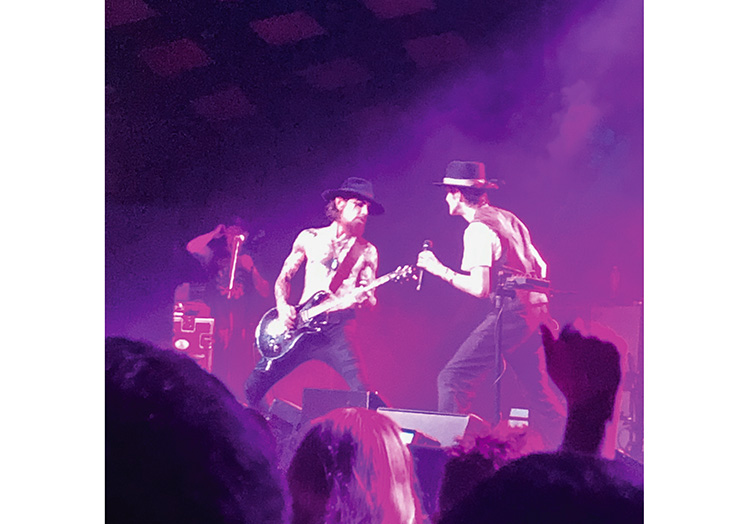
(Photo: Ray McClelland)
Listen For Mistakes
GG: Thank you! I think it’s important. Now, for my last question, I’d like to ask if you had any particular tips for playing, for other players who are fans that want to play, obviously, the box, or to get themselves out of ruts.
I don't even know how appropriate it is, given that, you know, you're such a kind of reactive player and you don't learn your parts, it's more like you're going on an adventure yourself. But it's maybe both me worth putting it to you anyway, I’d love to hear what you say?
DN: I listen for mistakes. You know there's that old joke that if in jazz, that if you make a mistake, play it again, and then it sounds on purpose? Well, I really do pay attention to mistakes. A lot of times, I'll make a mistake and I'll be like, ‘oh, that's quite good!’. And so, I would say, if there's any tip that I had, don't be afraid to explore and go into areas that you wouldn't expect to go to, because something might chime out that's completely original and different, that no other player would have thought to play. I always say that: just pay attention to your mistakes and don't get down on yourself because you made the mistake. See if the mistake actually can benefit you in some way.
It’s so good to have Jane’s Addiction and Dave Navarro back in action! I’m immensely appreciative to Dave for giving me so much of his free time whilst on a busy tour, and I’m thankful also to Beverly Fowler for putting us in touch.
Keep up with the touring and new releases over at the Jane’s Addiction official website, and head over to the guitarguitar interviews page for more interviews with artists such as Nine Inch Nails, Smashing Pumpkins, Steve Vai and many, many more.
Thanks for reading and I’ll see you again soon!


